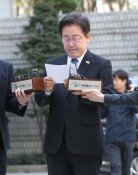Bilateral swap with China could make Korean won global currency
Bilateral swap with China could make Korean won global currency
Posted October. 12, 2012 02:04,
What can we do with this currency?
When the Korean government proposed a currency swap to the U.S. government, the Federal Reserve Bank and the Treasury Department were thrown into confusion. To them, exchanging the greenback, the world`s most used currency, with the Korean won, a largely unused currency, under no condition felt like a reckless adventure.
Seoul, however, convinced Washington that the sale of sovereign bonds by major economies to emerging economies facing financial instability could lead to a financial crisis of major economies. As a result, both countries signed a currency swap deal.
Korea, however, still cannot provide a solution for currency swap partner countries on how to use the won. Unless the won becomes an international currency, the same poor logic for a currency swap, that is if the Korean economy turns unstable, it will adversely affect the potential partner`s economy, will have to be repeated whenever a financial crisis hits the global economy.
To overcome Korea`s limits as a small open economy, the standing of the won must be suitable for the scale of the economy. Making the won an international currency will not be easy, but many experts say Korea needs to do what it can step by step.
○ We will make the won a global currency - political slogan
Previous Korean administrations set up policies to try to make the won an international currency. The Kim Dae-jung administration worked hard to this end after overcoming the Asian financial crisis, saying, Korea shall become one of Asia`s top three financial hubs along with Hong Kong and Singapore by 2011. The succeeding Roh Moo-hyun administration also said in 2006, A road map to make the won an international currency will be set up. Neither of the two governments, however, achieved tangible results.
Koreas GDP is the worlds 15th largest and the country`s trade volume is seventh. Despite the two impressive stats, the won has not been recognized enough on the international market.
According to the Bank for International Settlement, the share of the won in the global foreign exchange market in 2010 was just 1.5 percent out of 200 percent (Two currencies are necessary in currency exchange, thus the figure of 200 percent). The wons share of 1.5 percent is smaller than those of the Australian dollar (7.6 percent), Swedish krona (2.2 percent), or the New Zealand dollar (1.6 percent).
The won is hardly in demand even in trade. According to the Korea Customs Service, just 2.4 percent of exports and 3.4 percent of imports were paid in won in this year`s second quarter. Most won-denominated payments were made for Iranian crude oil shipments due to U.S. and European Union sanctions on Iran.
The Korean government has not pushed Korean exporters to pay in won because expanding foreign exchange reserves is a key policy. Choi Gong-pil, a senior adviser to the Korea Institute of Finance, said, The biggest cause of the failure was that each administration tried to achieve the goal (making the won a global currency) over its five-year term.
○ Pursuing feasible goals step by step
The Lee Myung-bak administration also included the goal among its top 100 policies in 2008. The global financial crisis, however, put a damper on the plan, but this year saw a glimmer of hope in this regard as Korea and China began discussing using currencies from a bilateral currency swap for trade payment.
China Renmin Bank will have Korean won through the bilateral currency swap. Payment in won in trade can be made if the Chinese bank lends won to Chinese companies so that they can pay won to Korean counterparts.
Seoul has pursued currency swaps in times of crisis, but wants to utilize the currency swap with Beijing as a stepping stone to the expansion of the won`s use on the international stage. The Korean government is considering offering incentives for won payments to selected Korean companies having many offices in China.
Experts expect a big step forward if companies can make trade payments in won. If this is realized, it will be a matter of time for people to use won for stock or bond trades in China, which could easily spread to Southeast Asian countries down the road.
Korea can refer to the successful examples of Australia and Singapore, which made their currencies international by liberalizing their capital markets through deregulation of offshore bonds.
Lee Seung-ho, a researcher at the Korea Capital Market Institute, said, Pushing the goal, namely making the won an international currency, too hard can create more short-term side effects than positive results...The most practical measure now is to lower exchange rate risk for business by increasing the share of won payments in trade.
Making the fundamentals of the Korean economy is a key to success. Essential foreign demand will grow when the Korean economic system is firmly based on steady growth and is strong enough to maintain stability against external shocks.
Korean Vice Strategy and Finance Minister Choi Jong-ku said, Korea`s fundamentals has been praised over this global economic downturn. We need to maintain our strong economic fundamentals for at least 10 years. If we can achieve this while overcoming inflationary pressure, external shocks and geopolitical risk, it will be only natural for the won to become an international currency.
january@donga.com







